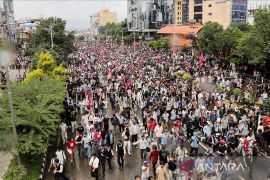The riots came one day before a planned nationwide protest to push for political reform but there was no immediate evidence of a direct link.
Spokespeople at the communication and interior ministries did not respond to requests for comment.
Riot police intervened to break up the protest, which evolved from a sit-in in front of the city hall to a march that gathered hundreds of protesters, the Moroccan branch of the local activist organisation Attac said on its website.
The sit-in was organised by Attac Maroc to push for the cancellation of a utilities contract that the city has awarded to an affiliate of the French firm Veolia.
Moroccans in cities where foreign firms run utility services often complain of hefty tariffs.
Residents, speaking on condition of anonymity, confirmed that a protest initially against utilities tariffs had developed into a march, which anti-riot police prevented from reaching the city centre.
"No tear gas, nothing was fired. They used long truncheons to disperse the crowds," one resident said.
Tanjanews.com published pictures showing the shattered windows of a police station and branches of firms affiliated to Veolia and the French bank Societe Generale, and said a branch of the latter had been set on fire.
A group of young Moroccans that calls itself the February 20 Movement for Change has called for nationwide protests on Sunday to push for constitutional reforms that would reduce King Mohammed`s powers and make the justice system more independent.
The group also wants to force the 47-year-old monarch to dismiss the government and dissolve parliament.
The group has gathered more than 17,000 Facebook fans, and opposition Islamists and leftist militants have announced they will join the protest.
Pro-monarchy militants have also announced counter-marches in support of a dynasty that has been ruling Morocco for almost 350 years.
Authoritarian Arab leaders are watching carefully for signs of unrest spreading through the region after revolts in Tunisia and Egypt. But the credit rating agencies Standard & Poor`s and Fitch have said Morocco is the least likely of the Maghreb states to be affected by the wave of popular unrest. (*)
Editor: Kunto Wibisono
Copyright © ANTARA 2011






